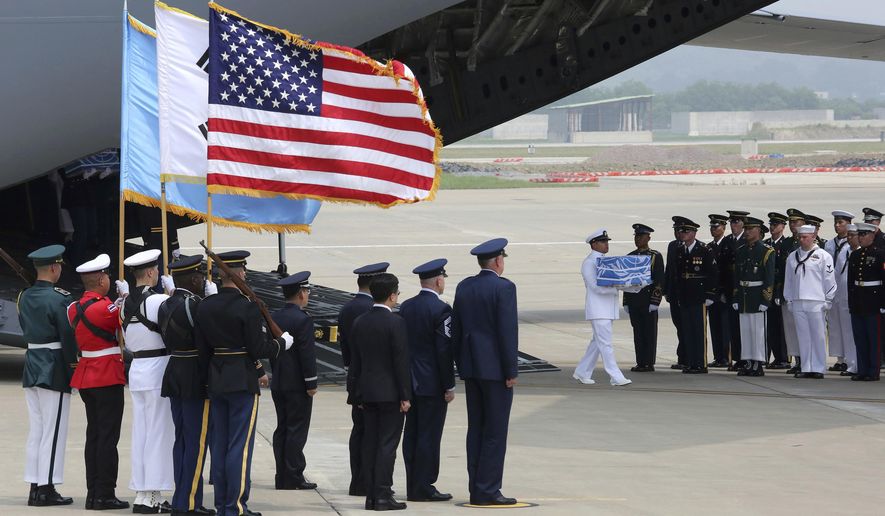PYONGYANG, North Korea (AP) - North Korea made good on another promise to President Donald Trump by returning dozens of sets of remains of American GIs killed during the Korean War. But it expects something in return - a peace treaty, or something very much like it.
Until that’s on the table, real progress toward denuclearization will likely have to wait.
North Korean leader Kim Jong Un agreed in his summit in Singapore with Trump last month to resume returning remains.
But the North chose the most symbolic day to actually turn over the first batch. Friday was the 65th anniversary of the end of the 1950-53 Korean War, which concluded not in a formal peace treaty but in an armistice agreement that was supposed to be temporary but has stayed in effect ever since.
That, to North Korea, says it all.
North Korea’s demand all along has been that improved relations between the two countries must begin with the creation of a stable peace on the Korean Peninsula, not with the unilateral abandonment of the North’s nuclear weapons that the Trump administration has been pushing for. North Korea’s logic is that both sides need to take simultaneous action to gradually improve the security climate.
Denuclearization, if it will come at all, will only come once that hurdle has been cleared.
“The adoption of the declaration on the termination of war is the first and foremost process in the light of ending the extreme hostility and establishing new relations between the DPRK and the U.S.,” the North’s Korean Central News Agency said in a statement on Tuesday, referring to North Korea by its official name, the Democratic People’s Republic of Korea.
“Peace can come only after the declaration of the termination of war,” it said.
To keep the ball rolling in the meantime, North Korea has announced a moratorium on nuclear tests and long-range missile launches. It has demolished structures and the entrances to buildings on the site of its underground nuclear testing facility in Punggye-ri, and appears to have begun dismantling some of its missile testing facilities at Sohae. It has also returned three Americans who were being held in jail and has significantly toned down its anti-U.S. propaganda.
All should be seen as significant, positive steps - certainly when compared to last year, when the U.S. and North Korea were trading insults and threats of nuclear war.
But none of the North’s actions so far have much to do with actual denuclearization.
North Korea has yet to declare what its nuclear program consists of - how many bombs it has, where they are built - information that must be revealed to Washington before any credible denuclearization process can even begin. The moratoriums could easily be rescinded if Kim chooses to do so, and experts believe new underground testing tunnels and missile test sites could be rebuilt in a matter of months.
Friday’s repatriation of the American remains was also fairly low hanging fruit for North Korea.
The remains of more than 5,000 American soldiers are believed to be recoverable in the country, and it is possible the North already has collected hundreds of remains that it could turn over at any time. The remains issue is clearly not directly linked to denuclearization, but shifts the focus back to trust-building and goodwill measures.
This isn’t the first time the North has cooperated with repatriating remains.
Such missions had been held from 1996 until they were canceled by President George W. Bush amid heightening tensions over the North’s nuclear program in 2005. The remains returned Friday are believed to be some of the more than 200 that North Korea has held in storage for some time, and were likely recovered from land during farming or construction.
The vast majority of the war dead has yet to be located and retrieved from cemeteries and battlefields across the countryside.
Following an honors ceremony next Wednesday, the remains are to be flown to Hawaii for scientific testing. A series of forensic examinations will be done to determine if they are human and if the dead were American or allied troops killed in the conflict. North Korea has had problems with identifying remains in the past, famously sending a set to Japan that it claimed were of an abducted Japanese citizen, but which Tokyo said turned out to be dog bones.
Trump’s immediate response, nevertheless, was gratitude.
“After so many years, this will be a great moment for so many families,” he tweeted. “Thank you to Kim Jong Un.”
The repatriation of remains could be followed by stronger North Korean demands for fast-tracked discussions to formally end the war. South Korea’s Defense Ministry has announced the North agreed to general-level military talks next week at a border village to discuss reducing tensions across the countries’ heavily armed border.
Experts say a declaration to officially end the war, which could also involve Seoul and Beijing, would make it easier for North Korea to steer the discussions with Washington toward a peace treaty, diplomatic recognition, security assurances and economic benefits. Some analysts believe that North Korea would eventually demand that the United States withdraw or dramatically reduce the 28,500 troops it keeps in South Korea as a deterrent.
Washington has maintained that North Korea won’t get sanctions relief and significant security and economic rewards unless it firmly commits to a process of completely and verifiably eliminating its nuclear weapons.
North Korea’s actions, however, appear to be aimed at chipping away support for that hard-line position.
___
EDITOR’S NOTE - Talmadge is the AP’s Pyongyang bureau chief. Follow him on Twitter and Instagram: @EricTalmadge




Please read our comment policy before commenting.